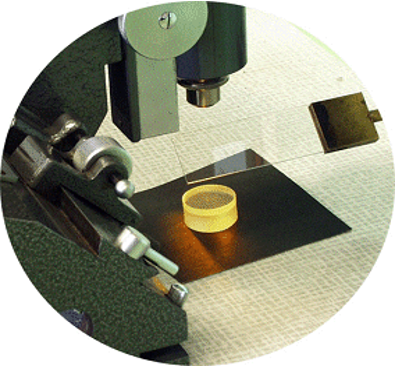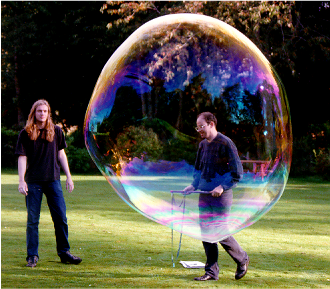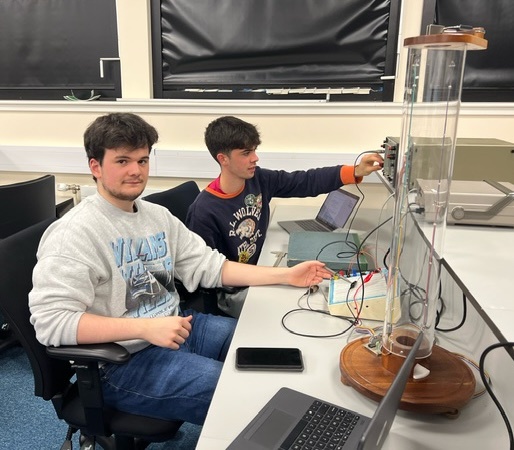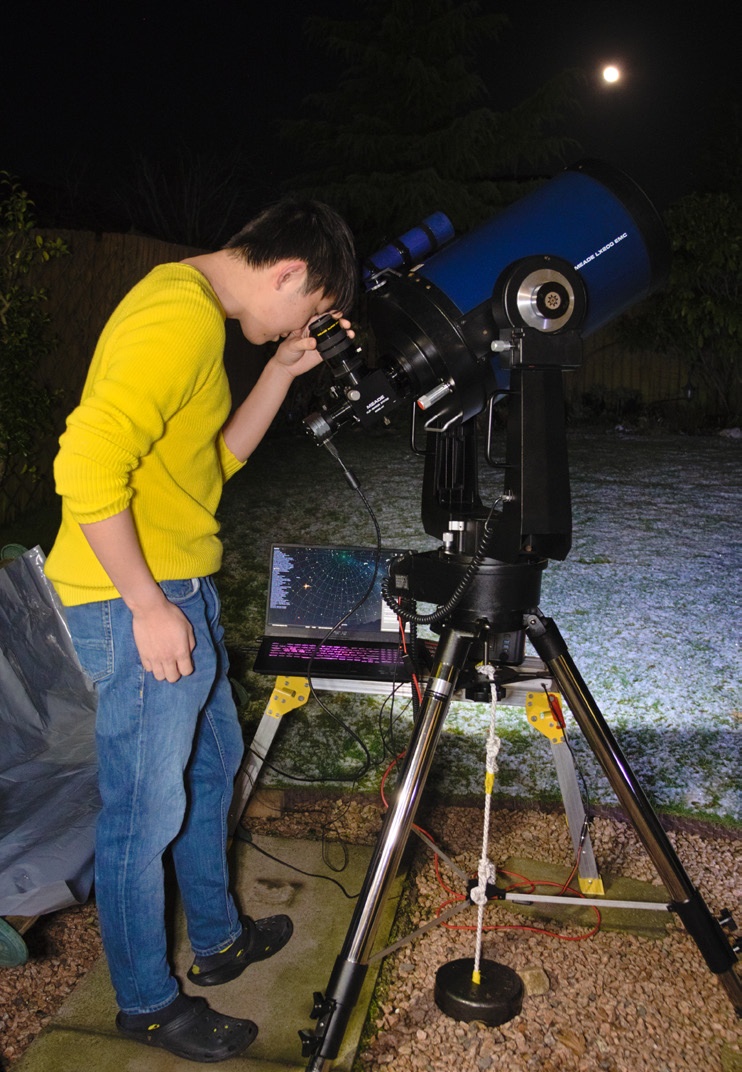The Department of Physics offers undergraduate programmes in Physics, both on its own as BSc Physics, and joint with other subjects such as Computing Science, Geology, Mathematics, and Philosophy. Postgraduate programmes include the MSc Data Science and PhD in Physics.
- Undergraduate
-

We offer a stimulating environment for learning, with small class sizes and friendly staff that you will truly get to know well as you study here. Our main aim is to build a solid foundation of physics knowledge, use that to teach you how to think differently about the world, and learn the widely applicable problem-solving skills of a physicist.

- We are ranked 6th in the UK for Physics - The Guardian University Guide 2024
- We are ranked 2nd in Scotland for Overall Satisfaction - National Student Survey 2023
Degree programmes
The links below take you to the full details about each degree. Undergraduate programmes are four years long, starting in September.
Our BSc Physics degree is accredited by the Institute of Physics, which means the programme satisfies the academic requirements for IoP membership, and provides a route to Registered Scientist (RSci), Chartered Physicist (CPhys), and Chartered Scientist (CSci) statuses.
Single honours:
Joint Honours:
- BSc Computing Science and Physics
- BSc Geology and Physics
- BSc Mathematics and Physics
- MA Philosophy and Physics
Major-Minor Honours:
Find more information about the courses that make up these degrees in the full list of 2024-2025 Undergraduate Physics, Computing Science, Geology and Geophysics, Geoscience, Mathematics, Mathematical Sciences, Philosophy, and Statistics courses.
BSc Physics degree structure
In the first three years, the course is heavily focused on core compulsory subjects, with some scope for optional choices. In the final year students do a research project and have more choice over their final taught courses.

During the first year, students take our foundational courses The Physical Universe A and The Physical Universe B, alongside essential mathematics courses Calculus I, Calculus II, and Algebra. All of these courses are taught to many students across the University, not just to BSc Physics students. Students also choose three optional courses, which can include the physics-taught Astronomy and Meteorology and Understanding Data. To help you feel confident in your maths level for Physics, during The Physical Universe A you will have an optional set of tutorials to bring you up to speed on mathematical topics should you need it. There are also drop-in sessions organised by the School of Natural and Computing Sciences, and the University offers maths skills support as part of the Student Learning Service.

In the third year, students cover a mixture of fundamental topics, applied subjects and general interest areas. We place particular emphasis on learning skills that professional scientists need to apply their knowledge. Compulsory subjects in the first term are Energy and Matter, Introduction to the Solid State, and Optics and Photonics. In the second term students study Advanced Practical Physics, Quantum Mechanics, and Electricity and Magnetism. Optional courses can include Structure of Matter and the Universe, Nuclear and Semiconductor Physics, and Professional Skills for Physics and Chemistry, although the exact courses do vary year-on-year.
The fourth year is heavily focused on the compulsory Project, which covers both terms, and can be theoretical, computational, experimental, or dissertation-based. Compulsory taught courses are Case Studies in Physical Sciences and Statistical Physics and Stochastic Systems. Optional courses include Nonlinear Dynamics & Chaos Theory Part I and Part II, and Modelling Theory.
- Postgraduate Taught
-
Degree programmes
You can study on campus or online.
Find more information about the courses that make up these degrees in the full list of 2024-2025 Postgraduate Taught Physics and Business Studies courses.
MSc Data Science
The MSc Data Science programme equips students with the essential data analysis and computational thinking skills needed to extract knowledge and insights from data. It covers machine learning, big data analytics, data visualisation, and data management, ensuring graduates are well-prepared for careers in data science.
We welcome graduates from a wide range of academic backgrounds who are looking to take advantage of the growing demand for data scientists across almost every industry sector today including finance, health, government, retail, and manufacturing. Many students come from science, technology, engineering, and medicine (STEM) backgrounds, but we also have students with backgrounds in business, arts, and the humanities.
The MSc Data Science programme starts in September or January each year. September starts take 12 months, and January starts take 16 months.
MSc Data Science and Business Management
This MSc programme is designed to bridge the gap between data science and business management through an interdisciplinary approach that equips you with the critical business and data science skills necessary to establish or lead successful data science teams or enterprises.
Combining the study of Data Science and Business Management offers a strategic advantage in today's data-driven world. The world of data is undergoing a period of profound transformation as companies and organisations manage ever- increasing volumes and diversity of data. In response, the importance placed on data collection, management and analysis by organisations of all sizes is increasing all the time as businesses strive to stay competitive in today's market.
The MSc Data Science and Business Management programme starts in September or January each year, and is 12 or 24 months long.
MSc Data Science degree structure
Taught courses are intensive, taking six weeks from start to finish. Most courses are continually assessed and involve a combination of theoretical presentations and computer practicals and demonstrations. The order of taught courses varies year-on-year, but typically:
Students take courses such as Introduction to Programming, Introduction to Python and R, Introduction to Data Science, Statistics and Time Series Analysis, Advanced Statistics and Special Applications, Image Analysis, Data Visualisation, and Machine Learning.
During Term 3 (or the Summer Term, for September starts) students carry out a Data Science Project, which is supervised by a member of staff. Students conduct research on a data science topic in an independent manner. They write an extended thesis and give an oral presentation on their work.
- Postgraduate Research
-
We offer a PhD in Physics. A PhD normally lasts three years.
From time to time, we also host MRes students. This is a one-year degree. It usually comes about by agreement between a student and supervisor, so If you are interested in doing this you should contact potential supervisors directly.
Research students usually have two supervisors, and access to specialised experimental or computational internal or external resources depending on their specific project.
For more details:
- Information about postgraduate research degrees at the University of Aberdeen.
- Information about postgraduate research in the School of Natural and Computing Sciences.
- Information about postgraduate research in the Department of Physics.
Research in the Department of Physics covers a broad spectrum of topics. These include astrophysics, chaos, complex systems, dynamical systems, and systems biology. We make particular use of mathematical modelling, which can be applied to medical and biological sciences as well as physical sciences.
Look through the list of PhD theses to see what recent PhD students have worked on.
PhD opportunities
The PhD Projects tab has details about current PhD project opportunities in the Department of Physics.
We post some PhD opportunities on FindAPhD.
You can also search University-wide PhD opportunities.
